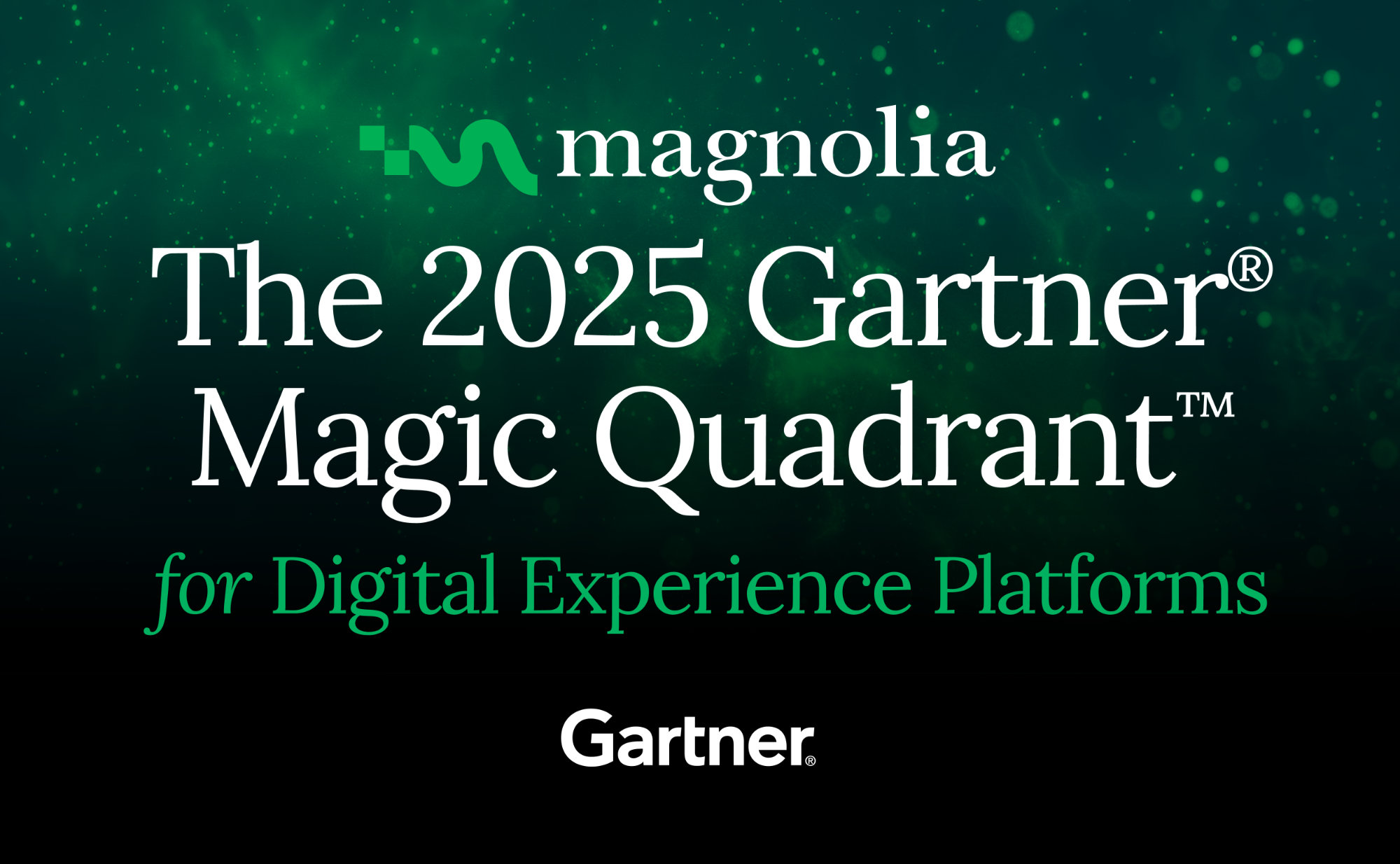- May 6, 2024
- 10 min
Composable DXP for modern ecommerce experiences
Magnolia in action
Take 12 minutes and a coffee break to discover how Magnolia can elevate your digital experience.
Composable Digital Experience Platforms (DXPs) are a major game changer in the growing landscape of digital commerce. They enable seamless integration of existing ecommerce systems with a headless CMS to deliver engaging content experiences for users across multiple touchpoints.
Some of the key benefits of implementing a DXP for ecommerce businesses are an enhanced customer experience, improved content management, and the flexibility to integrate various third-party tools and technologies.
The implementation of DXPs for ecommerce platforms is not only beneficial for the customers. DXPs provide in-depth customer analytics and insights for retailers to give them an extra edge. For example, Magnolia integrates with leading analytics platforms like Google Analytics to help retailers understand their audience’s behavior, preferences, and pain points.
Ecommerce is undergoing a significant shift, and meeting customers' expectations for personalized and unified shopping experiences is challenging. In this point, marketers turn their attention towards experience-driven commerce, as in addition to competitive pricing and fast shipping, brands must now deliver highly personalized content across multiple digital channels to enhance customer satisfaction.
This article will explain what a composable digital experience platform (DXP) is and how it helps you create modern ecommerce experiences. When commerce leaders and tech teams understand what a true fusion of content and commerce can bring—they can start building a strategy and architecture to achieve a more satisfying digital customer experience.
What is a Digital Experience Platform (DXP)?
A digital experience platform (DXP) is a solution that helps organizations manage and optimize customers' digital journeys across touchpoints like websites, mobile devices, and customer portals. It integrates various software systems and channels to centrally manage data, content, and experiences throughout the customer lifecycle.

Using different software systems and integrating them is nothing new. However, the emergence of the DXP concept led to the proliferation of the various customer experience channels and the growing need to unify these channels into a single platform that can effectively address the entire customer lifecycle.
Magnolia provides such a solution, sitting in the middle to serve as a unifying glue or mesh for managing data and delivering experiences across channels.
With Magnolia, businesses can leverage Connector Packs, which are pre-built integrations that connect Magnolia to various third-party systems such as CRM platforms, marketing automation tools, or ecommerce solutions. These Connector Packs simplify the integration process and enable organizations to leverage their existing technology investments while expanding their capabilities.
Additionally, Magnolia provides a comprehensive API client that allows for custom integrations with other systems, providing flexibility and ensuring seamless data exchange and content delivery across the entire technology stack.
Read More: What is a DXP? (Digital Experience Platform)
Types of DXPs
DXPs come in two primary approaches: monolithic (suite) and composable.

Monolithic DXPs provide an all-in-one solution from a single vendor, but they often need more flexibility and can be limited in functionality;
Composable DXPs combine the flexibility of headless CMS and traditional DXP capabilities. More elaborately, composable DXPs offer a more flexible and modular approach, allowing businesses to select best-of-breed tools and seamlessly integrate them for personalized and engaging digital experiences. Magnolia exemplifies the flexibility of a composable DXP, enabling businesses to choose and orchestrate their preferred tools for exceptional digital experiences.
What's more, with a headless approach, your presentation layer is decoupled from backend commerce functionality, which means you can freely create frontend experiences and user interfaces without being limited by the complexity of backend systems.
Why should composability matter for commerce?
A composable DXP provides the foundation for you to digitally transform your business and allow you to embrace content and commerce successfully.
Many enterprises have existing legacy infrastructure that initially allowed them to do everything they needed. However, it has become apparent that an ecommerce system alone may not satisfy the need customers have for engaging experiences. With a composable DXP, you can easily integrate your existing ecommerce system with a headless CMS built to deliver high-quality content experiences on every digital channel.

Benefits of Composable DXPs for Ecommerce
Flexibility - Easily integrate anything you need to provide differentiated shopping experiences, whether that means a different payment method for shoppers or the latest AI tool for your internal teams. This flexibility allows you to experiment and change these tools as you require.
Customizability - You can customize your software stack so that it fits perfectly with the needs of your team, existing tools, and processes. You can also choose the channels and presentation frameworks that provide the best experience for your shoppers.
Better Personalization - You can tailor experiences to the specific preferences of your shoppers and allow your brand to adapt more quickly, even as those preferences change. A composable DXP connects your entire customer ecosystem and allows you to draw on the insights required to personalize customer experiences.
Create Better Ecommerce Experiences with Magnolia
Magnolia for Ecommerce helps you create harmonious multi-channel shopping experiences from product description to check-out.
Building Your DXP For Ecommerce
The beauty of a composable DXP is that it enables you to select the best tools for each job. You can choose the DXP partners that work for your core functions. When building a DXP for today's modern ecommerce experiences, here are some of the critical capabilities you need.
Commerce
Your ecommerce system is an essential component of your composable DXP. It allows you to process all digital transactions for online shopping, manage products and catalogs, and provide other requirements of your ecommerce store.
For modern ecommerce experiences, a platform that supports headless ecommerce is ideal for powering your ecommerce functionalities in the backend. Using APIs to connect to the CMS and the front ends, you can create an appealing user experience, no matter the channel.
Magnolia, as a versatile composable DXP, seamlessly integrates with multiple ecommerce platforms, including Salesforce Commerce Cloud, to amplify your content–commerce experience and drive increased sales. Discover the power of combining Magnolia and Salesforce Commerce Cloud to unlock new possibilities for your business.
Content management
Combining content and commerce wouldn’t be possible without a Content Management System (CMS). A CMS allows marketers and developers to create stories around your products, compelling landing pages and other content-rich experiences.
A modern headless CMS at the center of your DXP provides APIs enabling developers to use content in any front end on any channel where customers may want to shop. It also provides marketers with user-friendly features to create, edit, preview, and publish content to each of these channels. Create once, publish everywhere.
Magnolia's hybrid headless CMS fosters collaborative efforts between marketers and developers, providing a centralized hub for content management. It enables developers to build applications using their preferred frameworks and consume content through APIs while the digital marketing team facilitates content reuse across the web and all channels. Magnolia's Headless Accelerator offers a comprehensive design system and unified workflow, accelerating frontend development.
Asset management
Building rich shopping experiences requires brands to have thousands of digital assets. From images and videos to documents, audio files, and more, a Digital Asset Management (DAM) system helps house all of these assets and makes it easy for users to quickly and easily locate them to include in pages and campaigns.
Magnolia offers a powerful DAM solution that integrates seamlessly with leading DAM platforms like Bynder, Cloudinary, Frontify, and Amazon S3. Additionally, by leveraging the capabilities of OpenAI's DALL-E, Magnolia enables on-the-fly image generation, further enhancing the dynamic nature of content creation. With Magnolia and its DAM integrations, brands can streamline their asset management processes and unlock the full potential of their digital experiences.
Search
Search functionality is essential for any successful digital platform, especially as many brands have thousands of products. Making search functionality available throughout various channels can enhance the customer experience by allowing customers to quickly search for the products they're looking for without browsing the entire catalog.
With its versatile integration options, Magnolia seamlessly incorporates various search solutions to meet specific requirements. Among popular integrations are Solr and Algolia, both offering powerful search capabilities that enhance discoverability and optimize the overall search experience for customers. With Magnolia's integrated search functionality, brands can empower customers with efficient and effective search capabilities, ultimately driving engagement and conversion rates.
Customer data
A Customer Relationship Management (CRM) system or Customer Data Platform (CDP) stores all of the information about your customers, from their previous purchases to their current interactions with your brand. Integrating a CRM/CDP into your DXP allows you to leverage that information to improve the customer experience at every stage of their journey, personalizing and optimizing it as necessary.
Magnolia seamlessly integrates with any CDP, such as Segment, for effective customer data management, enabling you to create personalized content. With Magnolia, you can leverage Segment's insights to drive targeted engagement and deliver exceptional customer experiences.
Analytics
Connecting analytics to your DXP allows you to gather data from ecommerce transactions and customer interactions, draw insights, and leverage those insights to make better decisions. The right analytics tool can let you see which products sell most as well as the best-converting pages and marketing campaigns you’ve published.
These stand-alone, but tightly integrated services will be wrapped with whatever user interfaces needed - your online shop, a mobile app, a point of sale or digital signage in a physical store, and so on.
Magnolia seamlessly integrates with leading analytics platforms like Google Analytics, offering the Analytics Connector Pack modules that inject analytics data into the Magnolia UI. This integration allows authors and marketers to make data-driven decisions by configuring data suppliers, defining available data in the Analytics app, and building customizable dashboards with insightful charts and widgets. Harness the power of analytics within Magnolia to optimize your digital experiences and drive data-informed strategies.
Compose Modern Ecommerce Experiences With Magnolia
In digital commerce, brands face the critical challenge of delivering exceptional online experiences that cultivate customer loyalty. Magnolia's composable digital experience platform (DXP) is a powerful solution, empowering businesses to seamlessly blend content and commerce throughout the customer journey with astounding results.
With Magnolia's intuitive WYSIWYG editing, preview, and user-friendly interface, content authors gain the tools to craft compelling narratives across diverse channels effortlessly. No longer constrained by complex development processes, you can streamline digital content creation and embrace agility like never before.
But the benefits continue; Magnolia's extensive suite of additional tools and Connector Packs takes ecommerce experiencesecommerce experiences to new heights. Effortlessly integrate existing e-commerce platforms, build customized storefronts, and expand your brand's reach to align with its ambitions.

Don't just take our word for it: Marella, the fashion brand belonging to the Max Mara Group, one of the largest international fashion houses, sought greater control over its customer journey and simplified content management.
Ecommerce sites are a crucial sales channel for Marella, thus the Italian fashion brand was already equipped with a robust ecommerce platform. The challenge was to find a solution that would also integrate and allow for seamless management of Marella's editorial content.
As we've learned from the article above, DXPs for ecommerce combine two key ingredients that the Italian fashion brand was looking to integrate seamlessly: content and commerce. By embracing Magnolia's innovative DXP, Marella achieved seamless content management across multiple channels, delivering an omnichannel shopping experience that delighted customers.
Ready to unlock the true potential of your ecommerce strategy? Dive into Marella's success story and witness firsthand how Magnolia's Composable DXP revolutionized digital experiences and brought a significant e-commerce turnover. Elevate your ecommerce game with Magnolia today and embark on a journey of unrivaled success. Before taking the plunge, listen to some invaluable advice on how to approach digital commerce transformation from none other than Hannu Vangsgaard, former Salling Group Head of Digital and Ecommerce and now a digital consultant for the C-Suite at various organizations.
Learn more about Marella’s journey and the power of Magnolia by reading their case study.









